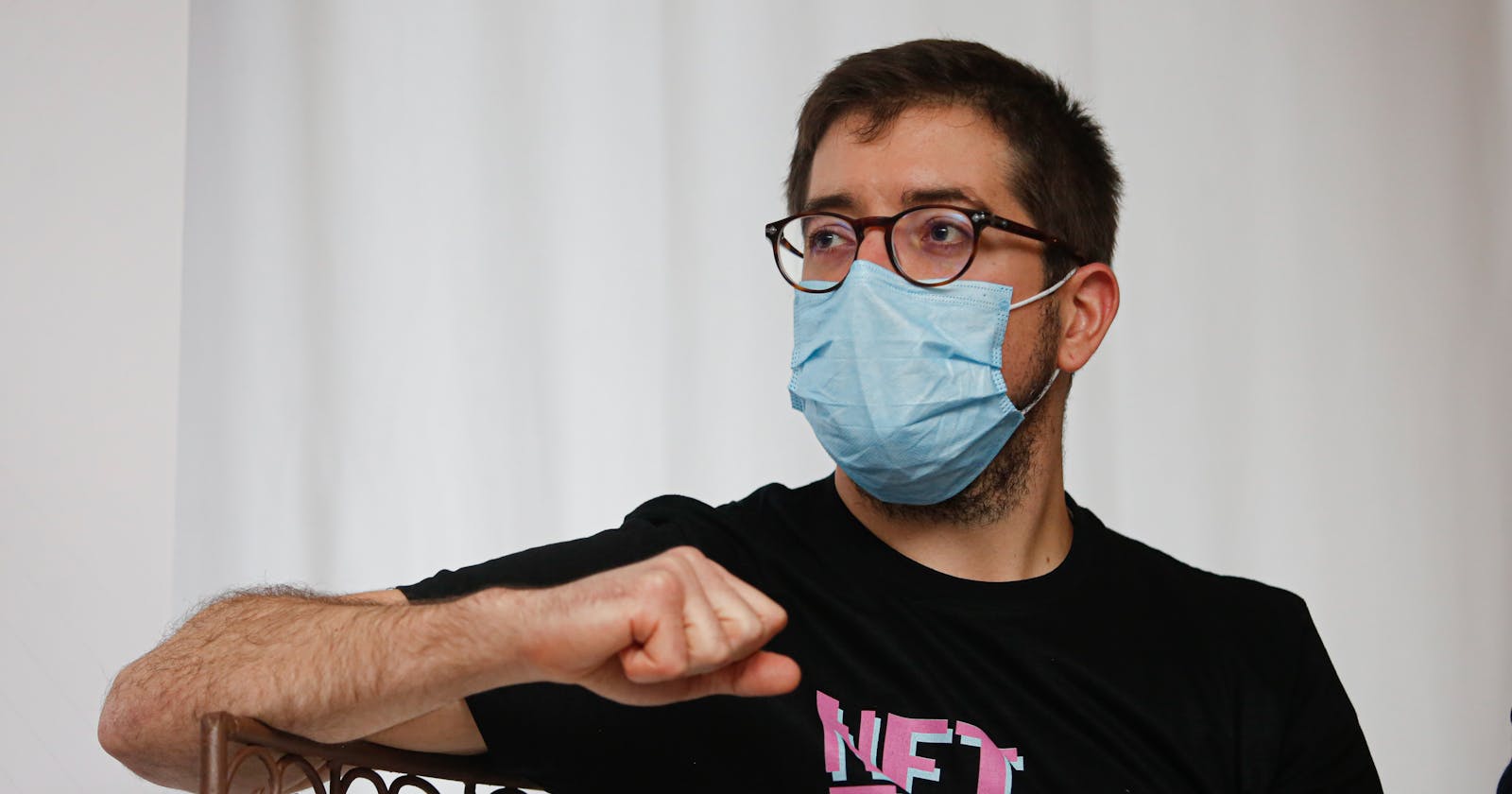David García: "The problem with blockchain is that people see it as just another technology, but it's not. It's a sociological shift"
García combines his work as a blockchain researcher with consulting sessions for companies and teaches at several business schools
The life of David García, an economics graduate, took a 180º turn when in 2017 he heard about blockchain technology for the first time. Specializing in the more financial branch, García decided to leave the tourism company he had founded with a partner to dedicate himself entirely to this pioneering technology.
Scroll down to the bottom to read the spanish version
Deslízate hasta abajo para leer la versión en castellano
"After working for different companies in Barcelona and London, I decided to start my own project, a mobile application. I was researching how to get more out of it when I came across blockchain technology and the so-called ICOs," recalls García [an ICO in the blockchain world refers to raising funding for a project by selling a cryptocurrency. The name comes from Initial Coin Offering or Initial Coin Offering]. "It was a new form of crowdfunding that was very successful at the time," he explains.
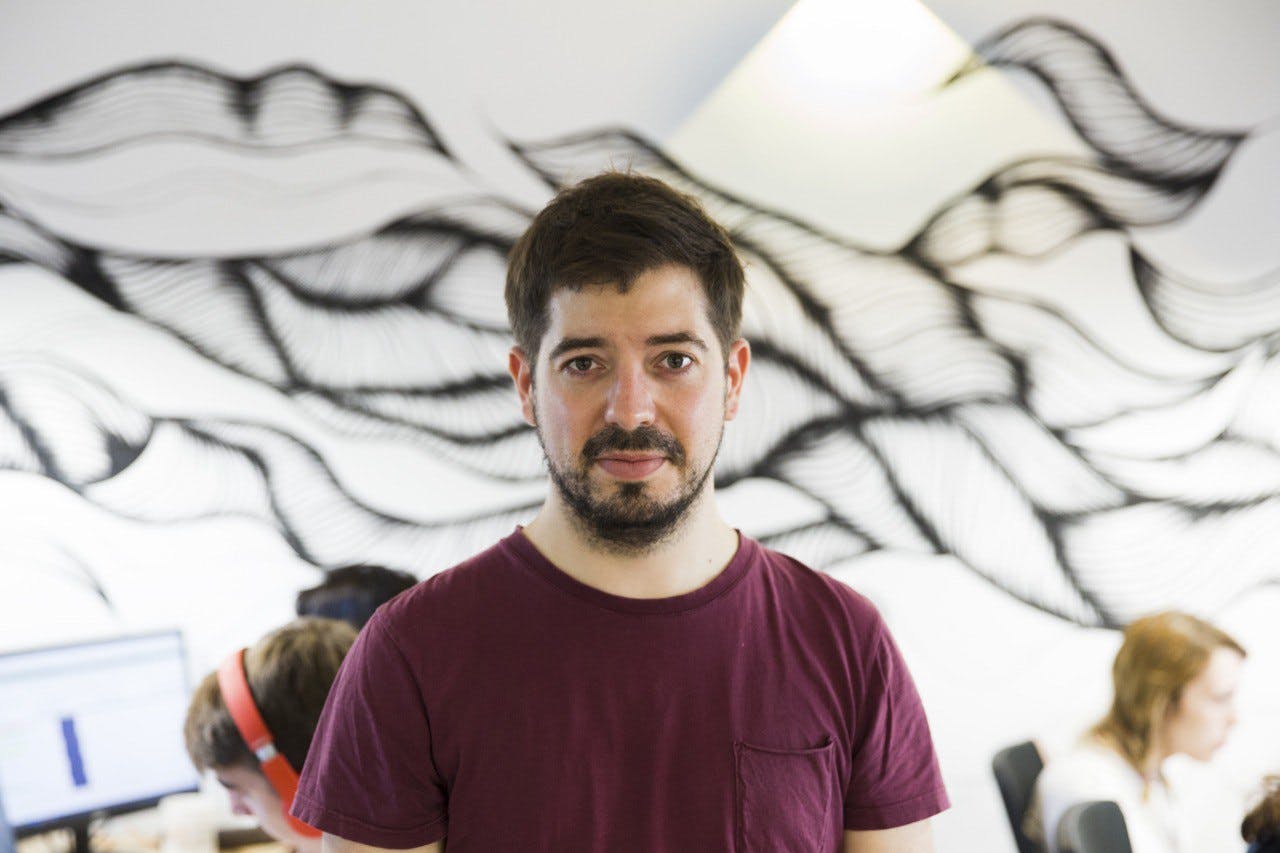 David García, professor, researcher and consultant specialized in blockchain.
David García, professor, researcher and consultant specialized in blockchain.
Although they never got to finish their ICO project, García, who was 30 years old at the time, dropped everything and began to study the different applications of blockchain technology in companies, focusing on consulting and coaching systems. At the time, he admits that it was not easy for him to find a school in which to learn about blockchain and enrolled in the only one that offered courses in Spanish. "There were eight of us in class," he comments with a laugh as he highlights the boom that this technology has had in the last four years. "Now there are between four and five schools dedicated entirely to blockchain in Spain. Although they are usually the same professors in all of them," he notes.
"If you want to be up to date with how this technology is evolving, you have to dedicate all your time to it, so if you want to dedicate yourself only to consulting or teaching, I'm sorry, but you're not going to be up to date," explains the young man, pointing out the dizzying speed at which this market is evolving. In his case, he devotes 100% of his time to research and once a year he conducts a four-month course at the EAE Business School in Barcelona, where he is the program director, on Fintech, blockchain and decentralized finance to expose to students everything he has learned in a year. "If it wasn't like this, I wouldn't be up to date and would be offering a backlog course to my students," he explains.
When asked why he decided to change his life and focus entirely on this technology, the professor assures that the world of blockchain brings together three of his passions: innovation, technology and finance. "The most interesting aspect of blockchain is that it can change society and that it has the economic incentives needed to bring about that change," he says with conviction. "In other words, you can participate in an NGO, ask for a minimum amount of money to support a cause and people will collaborate out of charity. However, with blockchain we can change the rules and make sure that those who are giving money get something back. That's an incentive," he argues.
The most interesting aspect of the blockchain is that it can change society and that it has the economic incentives needed to bring about this change".
During his university years, García recalls the limitation he felt when "studying an infinity of economic theories, more than 200 years old, which are tested over the years and are practically immovable". "Blockchain allows you to do financial social experiments instantly and globally, without the need to pay a group of students for years to try to find something new locally, as we did in class," he adds. In his opinion, "all economics universities should have blockchain classes as a base" since, "thanks to Smart Contracts, new rules of the game can be established that everyone can access due to the transparency of this technology".
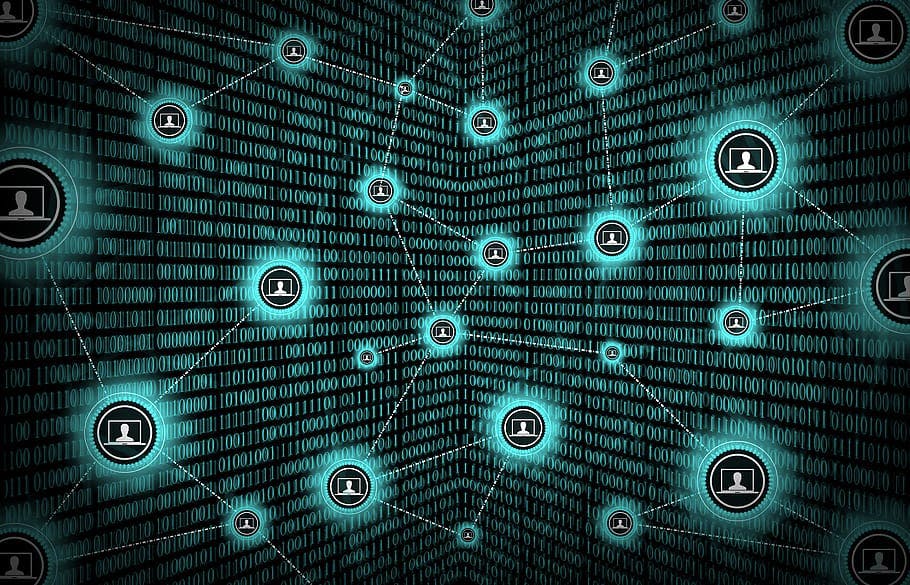
However, his fascination with 'blockchain' goes far beyond the financial branch, as the expert comments. "The advantages of blockchain come from the empowerment of users (citizens), of smaller companies with respect to large ones... It is something as intangible as empowerment, democratization," stresses García, who always begins the courses he teaches with a Philosophy class. "If you don't understand that this is a sociological change, we won't really understand the advantages of using this new technology," he assures.
"Blockchain allows you to do financial social experiments instantly and globally."
With respect to critics of this new technological current who claim that blockchain technology is not needed to modernize or innovate the current ecosystem, García reaffirms that the importance of the 'blockchain' does not lie in technological innovation, but in the sociological aspect. "We cannot empower people with current technology. With blockchain, we can. That is the goal," he remarks while confessing that, although it is not easy to make people understand the degree of sociological implication of this technology, once the paradigm shift is understood, the financial backing (through cryptocurrencies) works as an engine as it is an economic incentive. "Through the blockchain we empower the actors who are fighting for that sociological change with economic incentives in the form of tokens," he explains.
García gives the use of the watch as an example. "If I tell you it's 3.15 p.m. and you're not sure, you can look at the clock and check that, indeed, it's not. It is 11.30 a.m. Blockchain is exactly this, that I have something and you don't have to trust me to know if I'm telling the truth, but you can verify it. The clock is the decentralized way of knowing that we are all under the same time coordination. Do we need the clock to live? No, but we would not be coordinated when going to work, organizing meetings, eating... Blockchain is the same. If we use it we will be coordinated globally and we will know with certainty that we can trust each other because we can trust this system, this technology," he says.
"Through blockchain we empower the actors who are fighting for that sociological change with economic incentives in the form of tokens."
With respect to the DAO or Decentralized Autonomous Organization, García likens this structure to a globally coordinated cooperative in which the workers who contribute the most value to the organization are financially incentivized through Smart Contracts. The idea that this technology could spell the end of governments and banks as we know them does not seem so far-fetched to him, although he dismisses it completely. "It's true that with blockchain we don't need governments or institutions, just computer code that makes the system work. However, in the 1990s it was also believed that the Internet was going to mean the end of them and, in the end, what really happened is that there are four companies that control it," he argues. That is why he advocates education as a fundamental pillar to introduce blockchain technology in our society. "We have to educate the population so that they see that it is better to use decentralized networks and DAOs instead of turning to governments, banks, etc. And that they don't see blockchain as just another technology," he stresses.
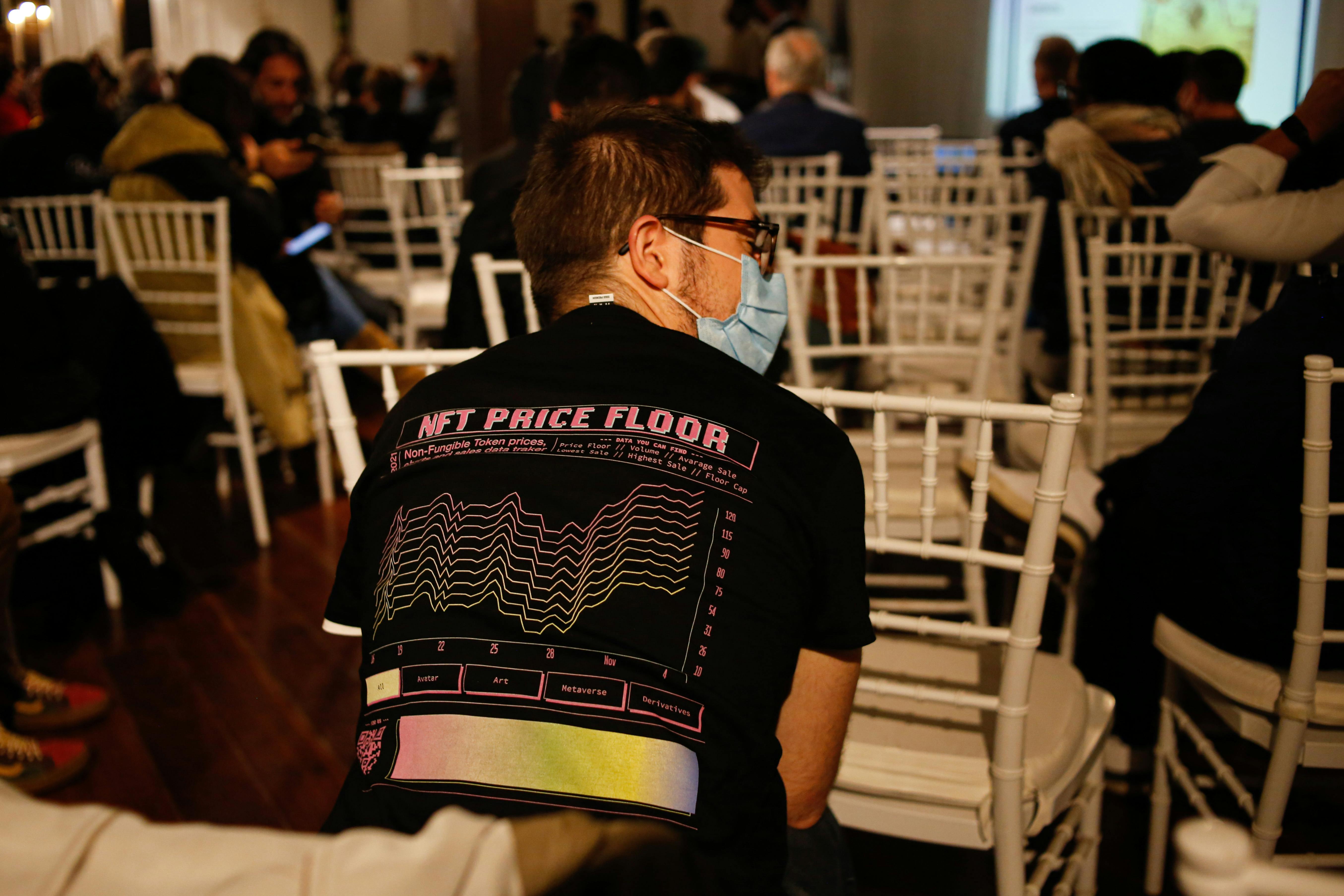 David García, at the Ibiza NXT conference last November at Agroturismo Atzaró.
David García, at the Ibiza NXT conference last November at Agroturismo Atzaró.
Asked about the hype of NFT collections, which began last year and whose volume of transactions in January 2022 amounts to 12,000 million dollars, the expert explains that it is "one more use of the blockchain", as cryptocurrencies had been until now, and he values very positively the future scope within the art world. "All art is going to be in NFT format," he assures without a hint of doubt. "And not only in art. For example, you have two avocados with two labels that say they are organic. On one you can check it by scanning a QR code that tells you the whole story of the product: where it comes from, type of cultivation, etc. And on the other, it doesn't. Which one is organic? Which one would you buy?" he asks.
Regarding art, "the same thing happens." "In addition to certificates of authorship and authenticity of the works, imagine that Paris Hilton sells a NFT, to give an example, and you buy it. You're not buying an NFT, you're buying Paris Hilton's NFT and already because of that it has another value. If you sell it, the value increases because it belonged to Hilton and previously to Picasso, another example. Thanks to the blockchain, the buyer can verify that, indeed, it belonged to these two personalities, so there is no risk of fraud," he argues.
According to the professor, the pace of implementation of blockchain technology in our society is advancing by leaps and bounds and it is increasingly difficult to speak of a future that is not an immediate present. "Everything is going much faster than we think," he concludes.


David García: “El problema de la tecnología blockchain es que la gente lo ve como una tecnología más, pero no lo es. Es un cambio sociológico”
García combina su trabajo como investigador en blockchain con sesiones de consultoría para empresas y es profesor en varias escuelas de negocio, entre ellas la EAE Business School de Barcelona y Blockchain School of Management.
La vida de David García, licenciado en Economía, dio un giro de 180º cuando en 2018 escuchó por primera vez hablar sobre tecnología blockchain. Especializado en la rama más financiera, García decidió abandonar la empresa de turismo que había fundado junto a un socio para dedicarse por completo a esta pionera tecnología. “Después de trabajar para diferentes empresas en Barcelona y en Londres decidí empezar mi propio proyecto, una aplicación móvil. Estaba investigando cómo sacarle un mayor provecho cuando me topé con la tecnología blockchain y las llamadas ICO”, recuerda García [una ICO en el mundo blockchain se refiere a la captación de financiación para un proyecto mediante la venta de una criptomoneda. El nombre viene de Initial Coin Offering u Oferta Inicial de Monedas]. “Se trataba de una nueva forma de crowdfunding que tuvo mucho éxito en ese momento”, explica.
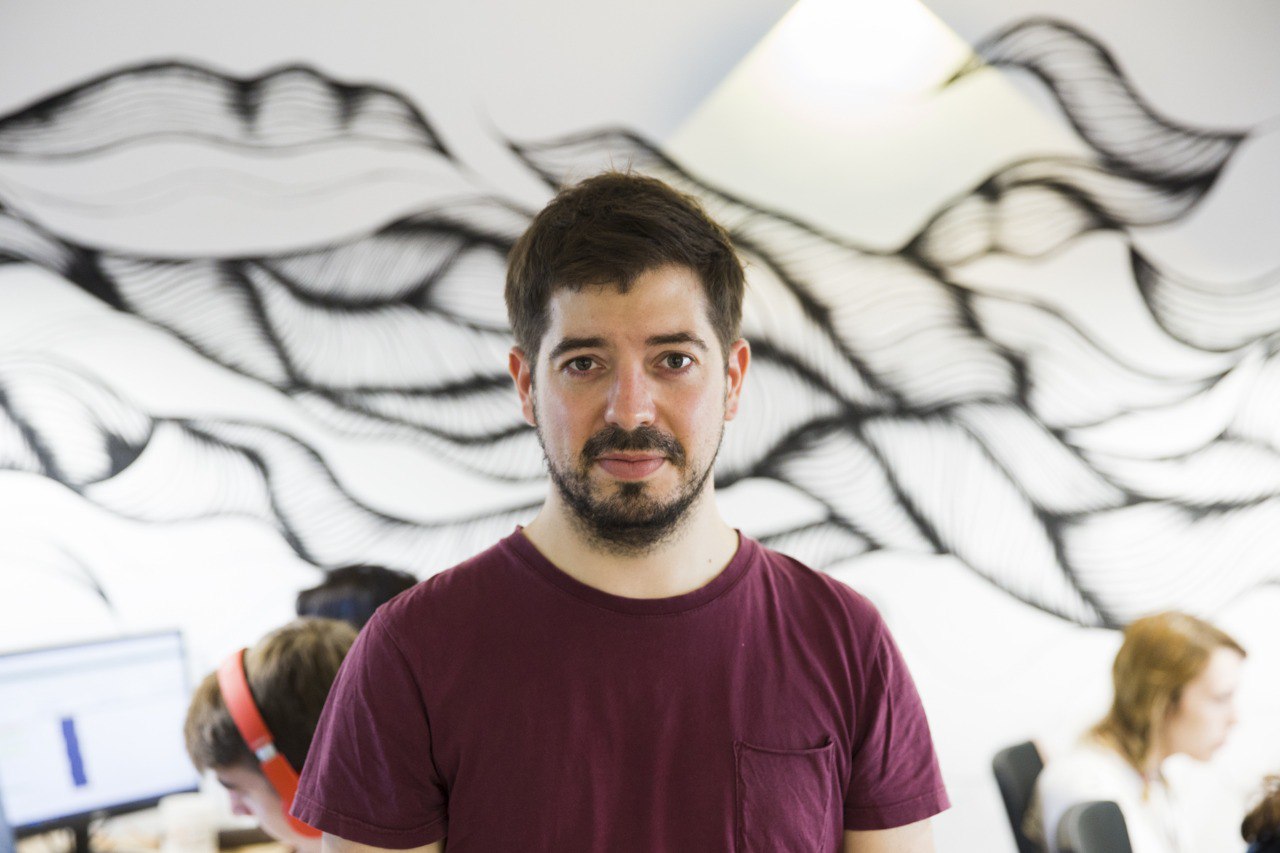 David García, profesor, investigador y consultor especializado en blockchain.
David García, profesor, investigador y consultor especializado en blockchain.
A pesar de que nunca llegaron a finalizar su proyecto ICO, García, que por aquel entonces tenía 30 años, dejó todo y se puso a estudiar las diferentes aplicaciones de la tecnología blockchain en empresas, enfocándose en la consultoría y en el sistema de coaching. Por aquel entonces, reconoce que no le fue fácil encontrar una escuela en la que aprender sobre blockchain y se matriculó en la única que ofrecía cursos en castellano. “Éramos ocho personas en clase”, comenta entre risas mientras destaca el boom que ha tenido esta tecnología en los últimos cuatro años. “Ahora ya hay entre cuatro y cinco escuelas dedicadas íntegramente a la blockchain en España. Aunque suelen ser los mismos profesores en todas”, apunta.
“Si quieres estar al día de cómo evoluciona esta tecnología tienes que dedicar todo tu tiempo a ello. Por eso, si quieres dedicarte sólo a la consultoría o a dar clases, lo siento, pero no vas a estar al día”, explica el joven mientras remarca la velocidad vertiginosa a la que evoluciona este mercado. En su caso, dedica el 100% de su tiempo a la investigación y una vez al año lleva a cabo un curso de cuatro meses en la EAE Business School de Barcelona, dónde es el director del programa, sobre Fintech, blockchain y finanzas descentralizadas para exponer ante los estudiantes todo lo aprendido en un año. “Si no fuese así, yo no estaría al día y estaría ofreciendo un curso atrasado a mis alumnos”, explica.
Cuando se le pregunta por el motivo por el que decidió cambiar su vida y centrarse por completo en esta tecnología, el profesor asegura que el mundo de la blockchain aúna tres de sus pasiones: innovación, tecnología y finanzas. “El aspecto más interesante que posee la blockchain es que puede cambiar la sociedad y que dispone de los incentivos económicos que se necesitan para que se dé ese cambio”, comenta convencido. "Es decir, tú puedes participar en una ONG, pedir un mínimo de dinero para apoyar una causa y la gente colaborará por caridad. Sin embargo, con blockchain podemos cambiar las reglas y conseguir que aquel que está aportando dinero reciba algo de vuelta. Eso es un incentivo”, argumenta.
“El aspecto más interesante que posee la blockchain es que puede cambiar la sociedad y que dispone de los incentivos económicos que se necesitan para que se dé ese cambio”
Durante los años de Universidad, García recuerda la limitación que sentía al "estudiar infinidad de teorías económicas, con más de 200 años de antigüedad, que se van probando a lo largo de los años y que son prácticamente inamovibles”. > “Blockchain te permite hacer experimentos sociales financieros de manera instantánea y global, sin necesidad de pagar a un grupo de estudiantes durante años para tratar de encontrar algo nuevo a nivel local, como hacíamos en clase”, añade. En su opinión, “todas las universidades de Economía tendrían que tener como base clases de blockchain” ya que, “gracias a los smartcontract se pueden establecer unas nuevas reglas del juego a las que todo el mundo puede acceder debido a la transparencia de esta tecnología".

Sin embargo, su fascinación por la 'cadena de bloques' va mucho más allá de la rama financiera, como comenta el experto. “Las ventajas de la blockchain vienen del empoderamiento de los usuarios (los ciudadanos), de las empresas más pequeñas respecto a las grandes... Es algo tan intangible como el empoderamiento, la democratización”, destaca García, que empieza siempre los cursos que imparte con una clase de Filosofía. “Si no se entiende que esto es un cambio sociológico, no entenderemos realmente las ventajas de utilizar esta nueva tecnología", asegura.
"Blockchain te permite hacer experimentos sociales financieros de manera instantánea y global"
Con respecto a los críticos de esta nueva corriente tecnológica que afirman que no se precisa de la tecnología blockchain para modernidad o innovar el ecosistema actual, García se reafirma en que la importancia de la ‘cadena de bloques’ no radica en la innovación tecnológica, si no en la vertiente sociológica. “No podemos empoderar a la gente con la tecnología actual. Con la blockchain, sí. Ese es el objetivo”, remarca mientras confiesa que, aunque no es fácil hacer entender a la gente el grado de implicación sociológica de esta tecnología, una vez se entiende el cambio de paradigma, el respaldo financiero (a través de las criptomonedas) funciona como motor al ser un incentivo económico. “A través de la blockchain empoderamos a los actores que están luchando por ese cambio con incentivos económicos en forma de tokens”, explica.
García pone como ejemplo el uso del reloj. “Si yo te digo que son las 15.15 horas y tú no estás segura, puedes mirar en el reloj y comprobar que, efectivamente, no lo son. Son las 11.30 horas. Blockchain es exactamente esto, que yo tenga algo y que tú no tengas que confiar en mí para saber si estoy diciendo la verdad, sino que puedas verificarlo. El reloj es la manera descentralizada de saber que todos estamos bajo una misma coordinación de tiempo. ¿Necesitamos el reloj para vivir? No, pero no estaríamos coordinados a la hora de ir al trabajo, de organizar reuniones, de comer... Blockchain es lo mismo. Si lo utilizamos estaremos coordinados de manera global y sabremos con certeza que podemos confiar en todos nosotros porque podemos confiar en este sistema, en esta tecnología”, relata.
A través de la blockchain empoderamos a los actores que están luchando por ese cambio con incentivos económicos en forma de tokens”
Con respecto a las DAO u Organización Autónoma Descentralizada, García asemeja esta estructura a una cooperativa coordinada a nivel global en la que se incentiva económicamente a los trabajadores que más valor aportan a la organización a través de los smartcontracts. La idea de que esta tecnología podría suponer el fin de los Gobiernos y los bancos, tal y como los conocemos, no le parece tan descabellada, aunque la descarta por completo. “Es verdad que con blockchain no necesitamos gobiernos o instituciones, solamente código informático que haga funcionar el sistema. Sin embargo, en los años 90 también se creía que Internet iba a suponer el fin de estos y, al final, lo que realmente pasó es que existen cuatro empresas que lo controlan”, arguye. Por eso aboga por la educación como pilar fundamental para introducir la tecnología blockchain en nuestra sociedad. “Hay que educar a la población para que comprueben que es mejor utilizar redes descentralizadas y DAOs en lugar de recurrir a los gobiernos, bancos etc. Y que no vean la blockchain como una tecnología más”, destaca.
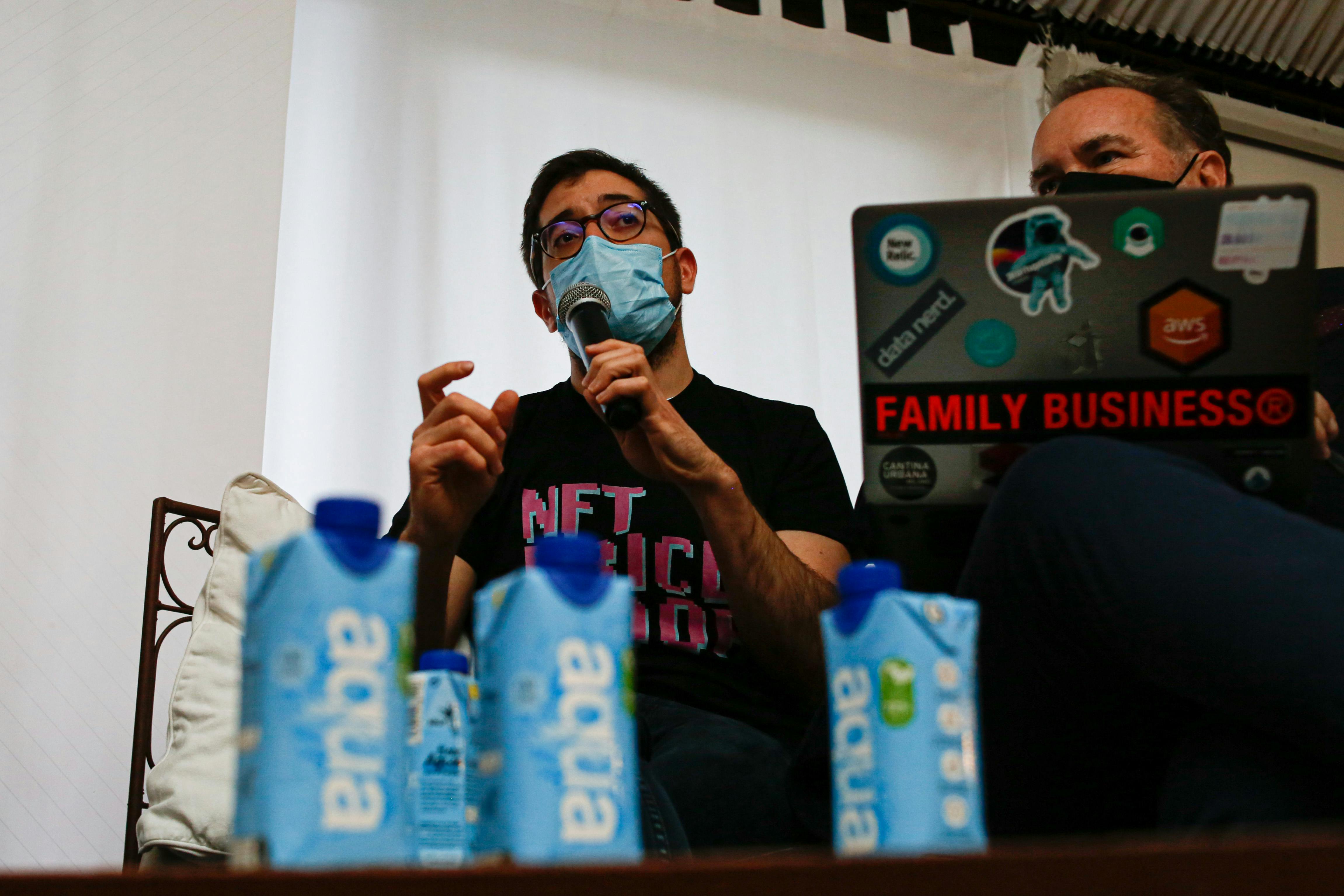 El experto en blockchain, durante la conferencia Ibiza NXT del pasado noviembre en Agroturismo Atzaró.
El experto en blockchain, durante la conferencia Ibiza NXT del pasado noviembre en Agroturismo Atzaró.
Preguntado por el hype de las colecciones de NFT, que comenzó el año pasado y cuyo volumen de transacciones en enero de 2022 asciende a 12.000 millones de dólares, el experto explica que se trata "de un uso más de la blockchain", como hasta ahora habían sido las criptomonedas, y valora muy positivamente el alcance a futuro dentro del mundo del arte. “Todo el arte va a ser en formato NFT”, asegura sin ningún asomo de duda. “Y no sólo en el arte. Por ejemplo, tienes dos aguacates con dos etiquetas en las que pone que son ecológicos. En uno lo puedes comprobar escaneando un código QR que te cuenta toda la historia del producto: de dónde viene, tipo de cultivo etc. Y en el otro, no. ¿Cuál te comprarías?”, pregunta.
Con respecto al arte, “lo mismo”. “Además de certificados de autoría y de autenticidad de las obras, imagina que Paris Hilton vende un NFT, por poner un ejemplo, y lo compras. No estás comprando un NFT, estás comprando el NFT de Paris Hilton y ya por eso tiene otro valor. Si lo vendes, el valor aumenta por haber pertenecido a Hilton y previamente a Picasso, otro ejemplo. Gracias a la blockchain el comprador puede verificar que, efectivamente, perteneció a estas dos personalidades, por lo que no hay riesgo de estafa”, argumenta.
Según el profesor, el ritmo de implantación de la tecnología blockchain en nuestra sociedad avanza a pasos agigantados y cada vez es más difícil hablar de un futuro que no sea un presente inmediato. “Va todo mucho más rápido de lo que pensamos”, concluye.

